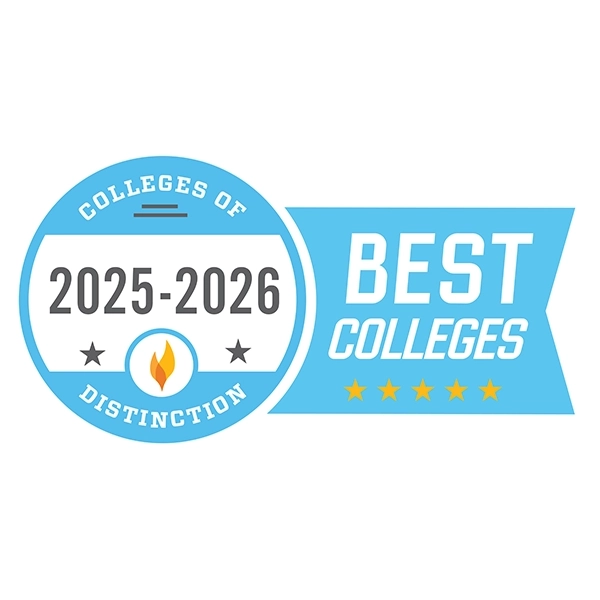
Walsh University's Master of Occupational Therapy program allows students to pursue a career in one of the nation's emerging fields. Ranked as the 8th best job in 2025 by U.S. News & World Report, occupational therapy continues to gain national recognition. The profession is projected to grow by 16% through 2030 (AOTA, 2023).
Occupational therapists work with clients to build or restore their abilities to perform daily tasks or "occupations" by utilizing a holistic approach. Each client is evaluated to determine not only the reason abilities have been impacted, but also to establish a personalized therapy plan that considers an individual’s responsibilities and everyday environment.
Walsh's MOT program is now offered in a hybrid format. While students still attend most classes in a face-to-face format, a few classes will be offered exclusively online, and others will be offered in a hybrid format (students complete some work online and then come to class to practice skills). We believe this will increase flexibility for students who need to work or have familial obligations outside of their academic pursuits. Online and hybrid courses have been carefully chosen and any course that includes hands-on practice skills will still meet in person. Courses are re-evaluated each semester and changes to format are made to best meet the needs of the students.
*The hybrid program has been approved by the Accreditation Council for Occupational Therapy Education (ACOTE)
We get this question a lot! The most obvious answer is that Master’s programs are shorter in length, so you can graduate and start your OT career sooner!
Graduates of a master’s program and doctoral program take the SAME certification exam from the National Board for Certification in Occupational Therapy (NBCOT) even though doctoral students attend classes for additional semesters and have to complete a 14-week experiential component in addition to 24 weeks of Level II fieldwork experience. National board certified occupational therapists only need 24 weeks of Level II fieldwork to apply for licensure in any state.
Employers do not differentiate between an entry-level master’s degree or entry-level doctoral degree in occupational therapy. Since both are considered “entry-level” degrees, there is no difference in pay after graduation.
Both degrees are appropriate for someone who wants to work as an occupational therapist. The entry-level doctoral degree offers additional semesters focusing on topics such as research, administration, policy development, education, and theory development. An entry-level doctoral degree is appropriate for students who would rather focus on these areas of practice. Seasoned clinicians often recommend waiting to obtain a doctoral degree until a therapist has been working for a few years and determines an area of OT he or she would like to specialize. At that point, a doctoral degree focused on the therapist’s intended career path can be pursued, making it easier to transition to the intended area of practice. Examples of these focused doctoral degrees include a Post-Professional Doctor of Occupational Therapy (OTD), a Doctor of Philosophy (PhD), a Doctor of Education (EdD), or Doctor of Health Science (DHSc).
For additional information, please visit the American Occupational Therapy Association website

Please contact Noelle Cole at ncole@walsh.edu for more information.
The Walsh University entry-level occupational therapy master’s degree program is accredited by the Accreditation Council for Occupational Therapy Education (ACOTE) of the American Occupational Therapy Association (AOTA), located at 7501 Wisconsin Avenue, Suite 510E Bethesda, MD 20814. ACOTE’s telephone number is 301.652.6611 and its Web address is www.acoteonline.org. Graduates of the program will be eligible to sit for the national certification examination for the occupational therapist administered by the National Board for Certification in Occupational Therapy (NBCOT). After successful completion of this exam, the individual will be an Occupational Therapist, Registered (OTR). In addition, all states require licensure in order to practice; however, state licenses are usually based on the results of the NBCOT Certification Examination. Note that a felony conviction may affect a graduate’s ability to sit for the NBCOT certification examination or attain state licensure.
ACOTE® accredited occupational therapy and occupational therapy assistant educational programs satisfy the states’ educational requirements in all states, the District of Columbia, and Puerto Rico. Students graduating from an ACOTE® accredited occupational therapy and occupational therapy assistant educational program are eligible to take the National Board for Certification in Occupational Therapy (NBCOT) certification exam and apply for licensure in all states, the District of Columbia, and Puerto Rico. For more information regarding state qualifications and licensure requirements, please refer to the AOTA State Licensure webpage.
Occupational Therapy Licensure Information by State
| Graduation Year | Entered | Graduated | Graduation Rate |
|---|---|---|---|
| 2025 | 30 | 25 | 93% |
| 2024 | 37 | 34 | 100% |
| 2023 | 38 | 33 | 87% |
| 2022 | 33 | 32 | 97% |
| Total | 138 | 124 | 94% |
Graduation rate calculation for OT programs is calculated as follows: The number of students who graduate on time (G1) divided by the number of students admitted in the original cohort (G2) minus the number of students who withdrew due to military, health, family issues, death and other reasons not related to academic and clinical performance (G3). Calculation per calendar year is = (G1/(G2-G3).
Accreditation Council for Occupational Therapy Education (2023). 2023 Accreditation Council for Occupational Therapy Education (ACOTE®) Standards and Interpretive Guide.
| Calendar Year | New Graduate % Pass Rate |
|---|---|
| 2024 | 94% |
| 2023 | 97% |
| 2022 | 100% |
| 2021 | 100% |